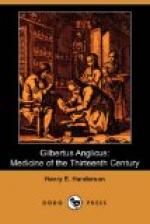And again: “Born and educated in the North, I did not share in any degree the fears of the Southerners over the election to the Presidency of Mr. Lincoln. I could not but think the action of the seceding States unwise and dangerous to their future prosperity. On the other hand, this action had already been taken, and without any prospect of its revocation. Indeed, in the present frame of mind of the North, any steps toward recession seemed likely to precipitate the very evils which the secession of the states had been designed to anticipate. I believed slavery a disadvantage to the South, but no sin, and, in any event, an institution for which the Southerners of the present day were not responsible. An inheritance from their fore-fathers, properly administered, it was by no means an unmitigated evil, and it was one, moreover, in which the North but a few years before had shared. All my interests, present and future, apparently lay in the South and with Southerners, and if the seceding States, in one of which I resided, chose deliberately to try the experiment of self-government, I felt quite willing to give them such aid as lay in my feeble power. When I add to this that I was 24 years of age, and naturally affected largely by the ideas, the enthusiasm and the excitement of my surroundings, it is easy to understand to what conclusions I was led.”
So on June 17, 1861, he volunteered in the Stafford Guards under Capt. (afterward Brigadier General) L.A. Stafford. The Guards became company B of the 9th Regiment of Louisiana Volunteers, Confederate States of America, Colonel (later Brigadier General) “Dick” Taylor (son of “Old Zach,” the President of the U.S.), in command. During the year that followed until the close of the war, Handerson experienced the adventures and trials of a soldier’s life. He knew picket, scouting, and skirmishing duty, the bivouac, the attack and defense in battle formation, the charge, the retreat, hunger and thirst, the wearisome march in heat and dust, in cold, in rain, through swamps and stony wildernesses. He was shot through the hat and clothing and once through the muscles of the shoulder and neck within half inch of the carotid artery, lay in a hospital, and had secondary hemorrhage. At another time he survived weeks of typhoid fever.
He was successively private soldier and accountant for his company, quarter-master, 2nd Lieutenant of the line, Captain of the line, and finally Adjutant General of the 2nd Louisiana Brigade, A. N. Va., under Lee and Jackson, with rank of Major. On May 4, 1864, Adjutant General Handerson was taken prisoner, and from May 17th until August 20th he was imprisoned at Fort Delaware in the Delaware river. He was then confined in a stockade enclosure on the beach between Forts Wagner and Gregg on Morris Island, until about the end of October, when he was transferred to Fort Pulaski at the mouth of the Savannah river, and in March, 1865, back to Fort Delaware. In April, after Lee’s surrender, many of the prisoners were liberated on taking the oath of allegiance to the Federal Government. But Handerson did not consider his allegiance to the Southern Confederacy ended until after the capture of President Davis, and it was not until June 17, 1865, that he signed the oath of allegiance and was liberated in Philadelphia.




